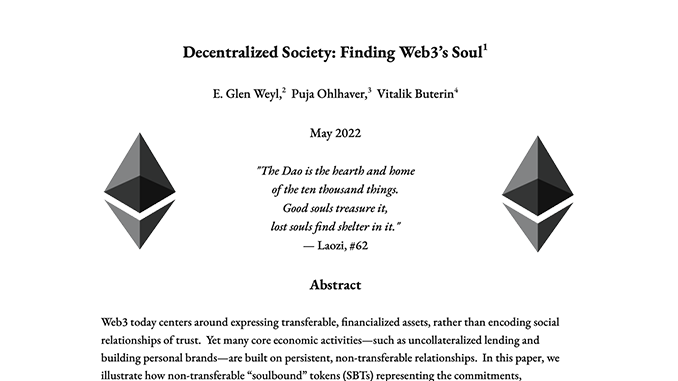
Ethereum mastermind Vitalik Buterin proposes to build a new system on the topic of digital identities with soulbound tokens as NFTs. According to Buterin, the possible applications for this are broad.
Normally, Vitalik Buterin is well known in the crypto scene as the inventor and co-founder of Ethereum (ETH). Currently, however, Buterin is making a name for himself with a side project called Soulbound Token (SBT). In 37 pages, Buterin scientifically lays out how and why a Web3 with a decentralized society could benefit from SBT. Buterin has found two co-authors, namely Microsoft specialist E. Glen Weyl and Puja Ohlhaver of Flashbots. Their vision: digital identities must be organized in a decentralized manner in the future to be trustworthy while enabling innovation.
They propose Soulbound Tokens as an elegant solution to this challenge. From a technological point of view, these tokens are NFTs that are bound to an identity and cannot be transferred. NFTs (Non-Fungible Tokens) are currently experiencing a lot of attention in the crypto industry through creative projects and gaming. There, NFTs are exciting because they are tokens that carry within them content that cannot be changed, but are freely tradable. So with Soulbound tokens, the plus point is to keep unique content, but exclude trading and sharing. Hence the name Soulbound, loosely translated as “bound to the soul”.
Buterin and his fellow campaigners see university exams and school or training qualifications as obvious uses for SBTs. Here, institutions would custom-issue an SBT that validates a degree, making CVs on the Web3 more trustworthy and meaningful. On the topic of digital identity, Cardano (ADA) has also identified the education sector as a good place to start, and is implementing a huge project in Ethiopia with up to 5 million participants.
Soulbound tokens, however, want to go further. According to the project study, they could also serve as ballots in decentrally organized referendums. SBTs could be used to make personal recommendations. Environmental or charity projects could issue SBT to supporters to prove their commitment. In interaction, Soulbound Token then creates something like an “extended CV.” SBTs would be documented in the blockchain and stored in a “soul wallet.” Those who wish could delete individual SBTs, for example because they no longer wish to emphasize a previous activity.
Conclusion: digital identity 3.0 – will a standard become established?
Buterin and the co-authors do not mention IT giants such as Apple, Amazon and Meta (Facebook) by name. But behind their push is, of course, the realization that in the coming Web3, digital identity will once again gain in importance. This also increases the interest of the market leaders, who already have a strong reach, in making their digital identities generated there the standard. In Buterin’s view, this must be countered by a decentralized system that does not focus on monetary value. A start has been made with the current publication on soulbound tokens. However, the chances of success for SBT will depend on whether a broad base can be formed.

Leave a Reply